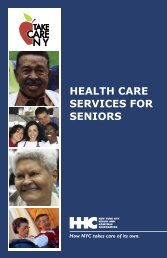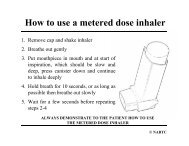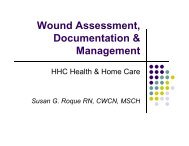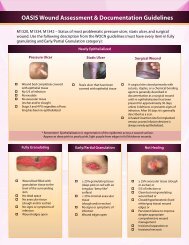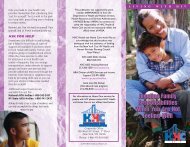HHC Health & Home Care Clinical Policy And
HHC Health & Home Care Clinical Policy And
HHC Health & Home Care Clinical Policy And
You also want an ePaper? Increase the reach of your titles
YUMPU automatically turns print PDFs into web optimized ePapers that Google loves.
<strong>HHC</strong> HEALTH & HOME CARE Section: 6-8<br />
Endocrine: Hypoglycemia __RN<br />
PURPOSE: PROCEDURE:<br />
To provide guidelines in the treatment of the<br />
hypoglycemic patient in a home care situation.<br />
CONSIDERATIONS:<br />
1. It is difficult to define hypoglycemia on the basis of a<br />
specific blood glucose concentration especially in<br />
people with diabetes. However, because lower<br />
glucose levels impair defenses against subsequent<br />
hypoglycemia, glucose levels lower then 72mg/dl<br />
can be defined as hypoglycemia. Hypoglycemia<br />
episodes vary greatly in severity. Due to individual<br />
variation in severity, hypoglycemia is defined by<br />
symptoms rather than specific blood glucose level.<br />
Mild hypoglycemia symptoms may include:<br />
sweating, trembling, tachycardia, dizziness, difficulty<br />
concentrating, lightheadedness and poor<br />
coordination. Severe hypoglycemia symptoms may<br />
include: mental confusion, lethargy, inability to selftreat,<br />
seizures and loss of consciousness. Be<br />
aware that some patients may have asymptomatic<br />
hypoglycemia.<br />
2. In some patients signs and symptoms of<br />
hypoglycemia may go undetected by the patient due<br />
to normal aging process, autonomic neuropathy,<br />
use of beta-blockers, and concurrent disease<br />
processes.<br />
3. Hypoglycemia is not a disease. It is a condition<br />
caused by an underlying problem or disease that<br />
prevents the body from maintaining normal levels of<br />
1. Adhere to Universal Precautions.<br />
2. Obtain blood glucose measurement. (See Blood<br />
Glucose Monitoring with Blood Glucose Meter, No.<br />
6.04.)<br />
3. Treat if blood sugar is 72 mg/dl or less. Also treat if<br />
the blood sugar is between 72-100 mg/dl and the<br />
patient is experiencing symptoms of hypoglycemia,<br />
e.g., tremors, diaphoresis, hunger, anxiety.<br />
4. Give a rapidly absorbed carbohydrate such as one<br />
of the following:<br />
a. 4 ounces of unsweetened fruit juice (Apple juice<br />
is recommended for patients with impaired renal<br />
function.) Repeat after 15 minutes if symptoms<br />
continue.<br />
b. 6 ounces non-diet soda<br />
c. 4 teaspoons of sugar in 4 ounces water<br />
d. 3-4 glucose tablets<br />
e. 8 ounce glass of milk (preferably no fat or low<br />
fat)<br />
5. Blood glucose should be retested in 15-30 minutes<br />
to determine appropriate rise in blood glucose.<br />
6. If the patient's next meal is more than one hour<br />
away, an additional protein and carbohydrate snack,<br />
e.g., sandwich, should be given.<br />
7. Glucagon may be given in the event of loss of<br />
consciousness if prescribed by the MD and if the<br />
prescription is in the home. (See Glucagon<br />
Administration No. 6.11.)<br />
glucose in the bloodstream. 8. In the event of unconsciousness, seizure or coma,<br />
4. Symptoms of hypoglycemia in insulin-treated<br />
patients can occur with normoglycemic blood<br />
glucose concentrations particularly if the blood<br />
glucose concentrations are decreasing rapidly.<br />
5. Patients taking insulin or oral agents to treat<br />
diabetes should be instructed in the signs an<br />
symptoms, treatment and prevention of<br />
hypoglycemia.<br />
EQUIPMENT:<br />
Blood glucose meter<br />
Automatic lancing device<br />
Gloves<br />
Alcohol wipe<br />
Puncture-proof container<br />
Impervious trash bag<br />
emergency transport to the hospital (911) should be<br />
arranged.<br />
9. Discard soiled supplies in appropriate containers.<br />
AFTER CARE:<br />
1. Document in patient's record:<br />
a. Signs or symptoms of hypoglycemia noted.<br />
b. Results of blood glucose test.<br />
c. Treatment given, patient's response to<br />
treatment.<br />
d. Instructions given to patient/caregiver.<br />
2. Notify physician of hypoglycemic incident.<br />
97



